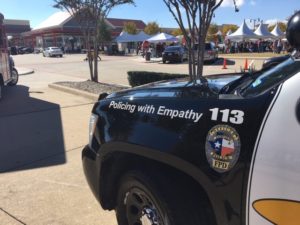The dictionary defines empathy this way: The ability to understand and share the feelings of another.
I knew the rough definition of the word when I noticed this morning this police car parked on the edges of a children’s festival in Fairview, Texas, where my wife and I had taken our granddaughter, Emma.
My first thought was that “Policing with Empathy” is one of the more unique law enforcement slogans I had seen. The usual fare declares PDs’ intent to “protect and serve.” Some of them in Texas have appropriated the phrase found on our currency: In God We Trust.
So, nosey guy that I am, I waited for the officer who belonged to the police cruiser toreturn to her vehicle. I approached her and asked her about the slogan, specifically, “What does it mean?”
Her initial answer was a bit vague. “We already have established that we trust in God,” she said, “so we now say we have empathy when we’re on duty.”
OK, I said … but what does it mean to “police with empathy”? I mentioned to the young officer that empathy suggests that one has an understanding of what someone else is going through, perhaps because they’ve experienced it, too.
She agreed. It’s a form of “community policing,” she said.
Fairview PD serves a Collin County community of more than 8,000 residents. Judging from all the hardware the officer this morning was wearing, my hunch is that the police department is well-equipped to handle any kind of call that officers must answer.
“We don’t want to approach a situation” where the officer instantly throws someone to the pavement, she said. “The chief knows what kind of officer he wants to hire,” she said.
Oh, the chief? He is Granver Tolliver, who — according to the Fairview website — brings more than 30 years of policing experience to his job. I will presume that with three decades of service under his belt, Chief Tolliver has damn near seen it all.
So, I got yet another education on the nuances of community policing. I am a big fan of the policy. I have seen how it works and my sense is that police departments that build relationships with the community they serve are better able to protect them when the need arises.
It helps, too, for officers to have empathy with those they serve.
